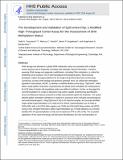The development and validation of EpiComet-Chip, a modified high-throughput comet assay for the assessment of DNA methylation status
Author(s)
Townsend, Todd A.; Manjanatha, Mugimane G.; Parrish, Marcus Curtis; Engelward, Bevin P
Downloadnihms873219.pdf (1.967Mb)
OPEN_ACCESS_POLICY
Open Access Policy
Creative Commons Attribution-Noncommercial-Share Alike
Terms of use
Metadata
Show full item recordAbstract
DNA damage and alterations in global DNA methylation status are associated with multiple human diseases and are frequently correlated with clinically relevant information. Therefore, assessing DNA damage and epigenetic modifications, including DNA methylation, is critical for predicting human exposure risk of pharmacological and biological agents. We previously developed a higher-throughput platform for the single cell gel electrophoresis (comet) assay, CometChip, to assess DNA damage and genotoxic potential. Here, we utilized the methylation-dependent endonuclease, McrBC, to develop a modified alkaline comet assay, “EpiComet,” which allows single platform evaluation of genotoxicity and global DNA methylation [5-methylcytosine (5-mC)] status of single-cell populations under user-defined conditions. Further, we leveraged the CometChip platform to create an EpiComet-Chip system capable of performing quantification across simultaneous exposure protocols to enable unprecedented speed and simplicity. This system detected global methylation alterations in response to exposures which included chemotherapeutic and environmental agents. Using EpiComet-Chip on 63 matched samples, we correctly identified single-sample hypermethylation (≥1.5-fold) at 87% (20/23), hypomethylation (≥1.25-fold) at 100% (9/9), with a 4% (2/54) false-negative rate (FNR), and 10% (4/40) false-positive rate (FPR). Using a more stringent threshold to define hypermethylation (≥1.75-fold) allowed us to correctly identify 94% of hypermethylation (17/18), but increased our FPR to 16% (7/45). The successful application of this novel technology will aid hazard identification and risk characterization of FDA-regulated products, while providing utility for investigating epigenetic modes of action of agents in target organs, as the assay is amenable to cultured cells or nucleated cells from any tissue.
Date issued
2017-07Department
Massachusetts Institute of Technology. Department of Biological EngineeringJournal
Environmental and Molecular Mutagenesis
Publisher
Wiley Blackwell
Citation
Townsend, Todd A. et al. “The Development and Validation of EpiComet-Chip, a Modified High-Throughput Comet Assay for the Assessment of DNA Methylation Status.” Environmental and Molecular Mutagenesis 58, 7 (July 2017): 508–521 © 2017 Wiley Periodicals, Inc
Version: Author's final manuscript
ISSN
0893-6692
1098-2280